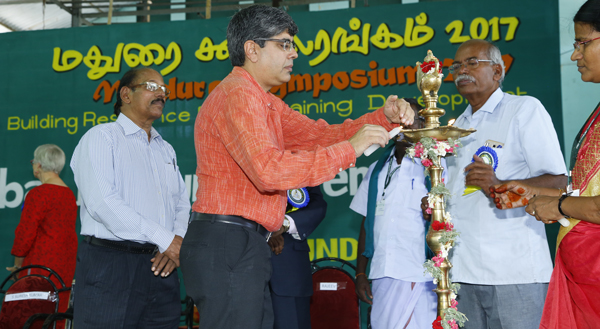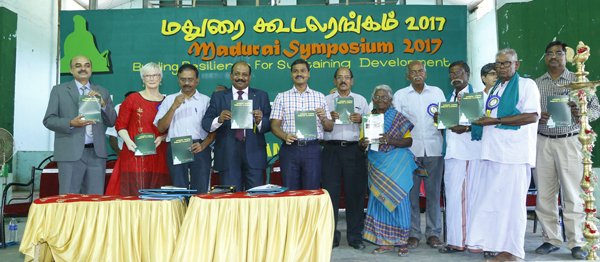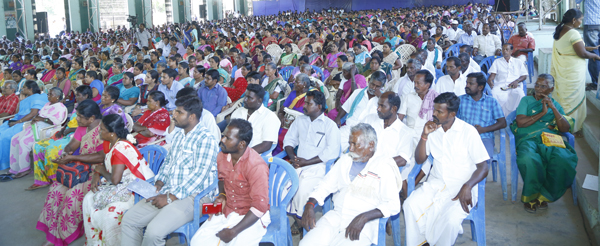
Case1-September-2017

Development stakeholders gather biennially at Madurai for “Madurai Symposium 2017” organised on the theme of Building Resilience for Sustainable Development to share, learn from each other’s experiences and practices and explore opportunities for collaboration. The symposium attracted diverse stakeholders in development: Community Organisations, Civil societies/ NGOs, Government, Banks, Insurance Companies, CSR Foundations, Donors, Philanthropists and Academia. Given the multifaceted development goals of Sustainable Development Goals (SDG), the Madurai Symposium 2017 had attempted to connect with the critical element of challenges in sustaining development processes towards achieving the goals. Building resilience is one of the crucial challenges and Madurai Symposium 2017 seeks to engage with the topical theme in the context of SDGs.
Globally, it has been recognised that development process would not be sustained, nay, stalled or even retarded due to lack of resilience. Resilience is the ability/capacity of the people, households, communities, countries to cope up with shocks and stresses through mitigation, adaptation and quickly recover in order to reduce chronic vulnerability and enable sustained development, inclusive growth and learning and transformative capacity. Building resilience is a progressive and long-term process that goes beyond humanitarian relief and development investment by addressing a wider set of inherently connected challenges that collectively prevent communities from achieving and maintaining development gains. It is obvious sustaining Post SDGs hinges on inherent buildup of resilience. Among the SDGs, from the perspective of resilience having larger impact in achieving the goals, the following themes rank high in the pecking order of priorities.

These themes have been so closely inter-related in terms of cause and effect, the complementarities of resilience building among these interconnected themes presents interesting challenges and opportunities.
It is quite evident through ages that communities getting organised and pulling together have demonstrated greater coping capacity to meet the challenges stemming from natural disasters, hazards, catastrophes, etc. In relative terms, among the communities, those endowed well economically have been able to show greater resilience to bounce back to normal. The poor being more vulnerable to shocks/stresses, the imperative of being organised and building larger social capital base cannot be overemphasised. Self-Help Group movement of poor women, for instance, has shown greater resilience in coping with risks and vulnerabilities in so many different ways in different contexts. These experiences when shared at the Madurai Symposium would enhance our understanding of the dynamics and nuances of how these communities prepare themselves and build resilience through collective action.
Farming is faced with multifarious risks and vulnerabilities than any other economic activity and building resilience is an indispensable part of this activity to make it a viable proposition in a sustainable way. In fact, the Goal-2 of SDG recognises this critical importance and emphasises promoting sustainable agriculture. In view of multiple dimensions of risk elements in agriculture, the challenge is greater as resilience has to factor in many imponderables. Foremost among them is natural elements with erratic rainfalls, prolonged droughts, increasingly high incidence of pests and diseases, followed by cultivation practices such as excess application of essential inputs, nil/low diversity in cropping pattern, etc., compounded by the market shocks, Building resilience is a sine quo non for sustainable agriculture and each of the ecosystems in farming be it wet-land, rainfed or coastal. call for understanding and evolving unique resilient practices. The Madurai Symposium sets the stage for showcasing successful resilient practices in different agriculture eco-systems.
Despite voices of climate sceptics, there is an overwhelming global acknowledgement that climate change is real and happening with its known and unknown consequences. It is widely acknowledged that human activity and excesses associated with that, particularly the energy sector, is the key trigger that induces climate change and its harmful consequences. On the other hand, climate change has widely disrupted the existing pattern of rainfall, temperature, etc. Green gas emissions induced through anthropogenic activities have been compounding the global problem. Communities and countries have launched mitigation and adaptation practices to combat climate change and build resilience. Many communities follow exemplary practices which compel the attention of policy makers, industries and governments. Effective and proven practices in coping with climate change challenges by different stakeholders including farming communities would be shared in the symposium.
Disasters, be it natural or man-made have frequent visitations than before leaving behind a trail of destruction and despondency. There has not been wider appreciation, of going beyond rescue and relief, reconstruction, about the critical importance of the resilience in disaster hotspots. In other words, building resilience has not been a deliberate process inherently woven with reconstruction and rebuilding lives. A global disaster response framework namely “Sendai Framework” has been evolved by the United Nations which guides the process of building resilience. In the recent past, wherever disaster struck, attempts are being made to make the resilience building among the disaster affected communities a process of rebuilding the livelihoods as in the Phailin disaster in Odisha and Hud-Hud in Andhra Pradesh. There have been similar experiences in different types of disasters and the symposium is the platform to present such experiences for sustaining development in disaster-prone areas.

We have highlighted a few areas of building resilience here in order to sustain the development and attain some of the sustainable development goals from the varied ecosystems in the Indian context. There exists an imperative need to understand the level of vulnerabilities and risks met by different social strata in different contexts, coping mechanisms practised by them, necessities for preparedness, and capacity building of bottom of the pyramid to make them resilient communities. In the Madurai Symposium 2017, development stakeholders would get platforms and opportunities for deliberating on the issues of building resilience in many conferences, seminars and workshops. Needless to say, these knowledge events would provide a stage to facilitate cross-learning through best practices, traditional coping mechanisms, veracity of impact of disasters and hazards on poor, research outcomes, etc.
As the resilience challenges are multifold and specific to region as well as context, the organisers of the symposium intend to involve the major stakeholders in building resilience process viz. community of women self-help groups, small and marginal farmers representing different natural eco-systems, fisherfolk, landless, etc. The conventions aim to elicit the experiences of these community stakeholders through dialogues, round-table and focus group discussions which ultimately result in greater learning that has to be drawn from those experiences for building relevant resilience for sustaining development.
The five-day event has brought together NGOs, academic and research institutions, government organisations, industries, banks, donor organisations, entrepreneurs, producer companies and cooperatives to host conventions, seminars, and workshops and conferences on topics relevant to the theme. Totally, 54 events comprising people conventions, conferences, seminars, and workshops were organised as a part of the event. In this edition of Development Matters, efforts were made to capture the perspectives and approaches of DHAN’s various initiatives and the way ahead in terms of development partners and the community expectations.